Common HVAC Issues That Disrupt Florida Commercial Properties
Commercial properties in Florida rely heavily on HVAC systems to...
Getting a new air conditioning system installed in Florida is a big deal. With the state’s hot and humid weather, an efficient AC is essential for staying cool and keeping energy bills under control. However, a new AC system is only as efficient as the steps you take to maximize its performance. Here are some practical ways to optimize energy efficiency after your installation.
Maximizing efficiency starts before the unit is even installed. Selecting the right air conditioner for your home’s size and layout is critical. A system that is too small will have to work overtime to keep your house cool, while one that’s too large will cycle on and off too frequently, wasting energy. Working with a knowledgeable HVAC contractor can ensure your new system is properly sized for your home’s unique cooling needs.
If you haven’t already, consider a unit with a high SEER (Seasonal Energy Efficiency Ratio) rating. In Florida’s climate, a SEER rating of 16 or higher is typically recommended. High-efficiency systems may cost more upfront but can lead to substantial energy savings over time.
Your thermostat plays a huge role in energy efficiency. Once your new AC is installed, program your thermostat to match your lifestyle. When you’re home, set the temperature to the highest comfortable level, usually around 78 degrees Fahrenheit. When you’re away, increase it by a few degrees. Smart thermostats can help automate these settings, learning your habits and adjusting accordingly to save energy.
It’s easy to overlook thermostat placement, but it makes a difference. Keep the thermostat away from direct sunlight, windows, and heat-producing appliances. This way, it won’t register false readings that could cause your AC to run longer than necessary.
Even the most efficient air conditioning system will struggle if your home has air leaks or poor insulation. Make sure windows, doors, and other openings are properly sealed. Weatherstripping and caulking can go a long way in preventing cool air from escaping and warm air from seeping in.
Check your home’s insulation, especially in the attic. Florida’s heat can easily penetrate a poorly insulated roof, making your AC work harder. Upgrading attic insulation can improve your home’s energy efficiency, making the most of your new AC system.
After installation, it’s important to maintain a clean and clear area around your outdoor AC unit. Overgrown grass, debris, or even lawn furniture can obstruct airflow, making your system less efficient. Regularly check the outdoor unit and clear away anything that could block ventilation.
The indoor air filters also play a crucial role. Dirty or clogged filters force your AC to work harder, reducing efficiency and increasing energy consumption. Check filters monthly and replace them at least every three months—or more often if you have pets or allergies. Clean filters not only improve energy efficiency but also ensure your home has better air quality.
Ceiling fans don’t lower the temperature of a room, but they create a wind chill effect that makes you feel cooler. This allows you to set the thermostat a few degrees higher without sacrificing comfort. Make sure fans rotate counterclockwise in the summer to push cool air down. Remember to turn fans off when you leave a room, as running them when no one is around wastes energy.
Florida’s blazing sun can heat your home quickly, causing your AC to work harder. Strategic landscaping, like planting trees or shrubs around your home, can provide natural shade. Over time, this can significantly reduce the amount of heat your home absorbs. Additionally, keep blinds or curtains closed during the hottest parts of the day to minimize indoor heat gain.
Reflective window films or solar screens are also great investments. They help block heat from entering your home while still allowing natural light to filter through, keeping rooms cooler without relying solely on your air conditioning.
Routine maintenance is key to keeping your AC system running efficiently. Even a brand-new system needs regular check-ups to perform its best. Schedule a professional HVAC tune-up at least once a year. Technicians can inspect the system, clean components, and identify any potential issues before they become costly problems.
Maintenance visits often include checking refrigerant levels, tightening electrical connections, and ensuring all moving parts are properly lubricated. Keeping your system in peak condition will extend its lifespan and maintain energy efficiency.
Florida’s humidity can make even moderate temperatures feel unbearable. An air conditioner naturally reduces humidity, but during particularly muggy days, it may struggle to keep up. Using a whole-house dehumidifier can lighten the load on your AC, making it more energy-efficient. By reducing indoor humidity, you’ll feel more comfortable at higher thermostat settings, saving energy and money.
Simple lifestyle adjustments can help your new AC work more efficiently. During the hottest parts of the day, try to minimize heat-producing activities like cooking, running the dishwasher, or using the dryer. Instead, plan these tasks for early morning or evening when temperatures are cooler. Switching to LED light bulbs also helps, as they emit less heat than traditional bulbs.
If you’re serious about maximizing energy efficiency, consider upgrading to energy-efficient windows. These windows are designed to reflect heat and keep cool air inside. While it’s a more significant investment, it can dramatically improve your home’s overall energy efficiency. Combined with your new AC system, energy-efficient windows will keep your home cooler and reduce your utility bills.
Proper ventilation can also help reduce your cooling load. Kitchen and bathroom exhaust fans can quickly remove heat and humidity. However, be sure to turn these fans off once the excess heat is gone to avoid pulling out too much cool air.
Consider ventilating your attic, too. An attic that’s well-ventilated can help lower indoor temperatures, making it easier for your AC to cool your home.
Finally, staying aware of your energy habits is crucial. Turn off lights when not in use, unplug electronics that aren’t needed, and close doors to unused rooms to reduce the area your AC needs to cool. The more mindful you are of energy use, the better your new AC system will perform.
Maximizing energy efficiency with your new AC installation in Florida requires a combination of smart choices, regular maintenance, and good habits. By following these steps, you’ll enjoy a cool and comfortable home without excessive energy costs. Investing time in optimizing your AC’s performance will pay off in lower utility bills and a longer-lasting system.
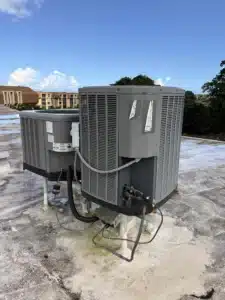
Commercial properties in Florida rely heavily on HVAC systems to...
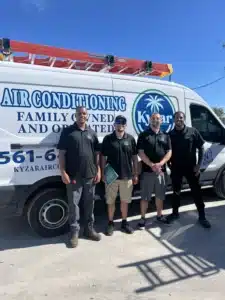
For many Florida homeowners, scheduling HVAC service feels like a...
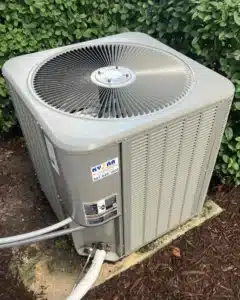
In a warm coastal climate like West Palm Beach, air...
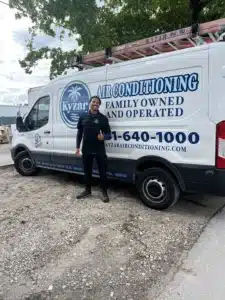
Living in West Palm Beach means living with heat, humidity,...
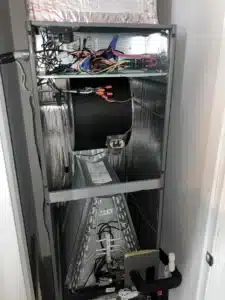
Florida HVAC systems work harder than those in almost any...
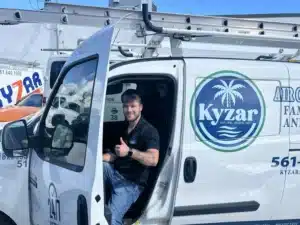
Indoor air quality plays a major role in how a...